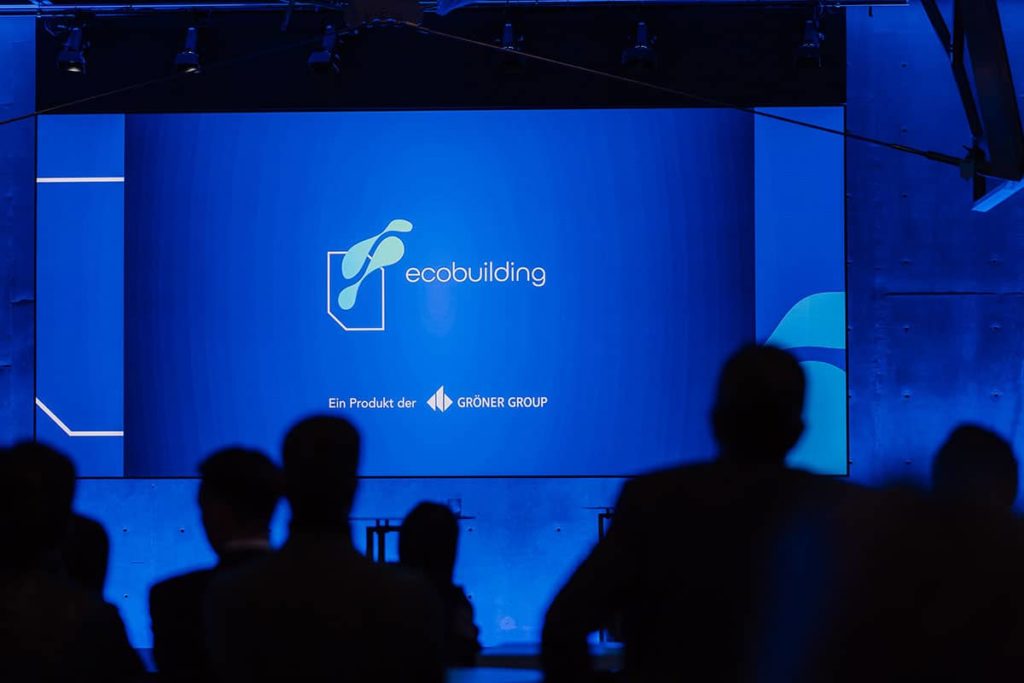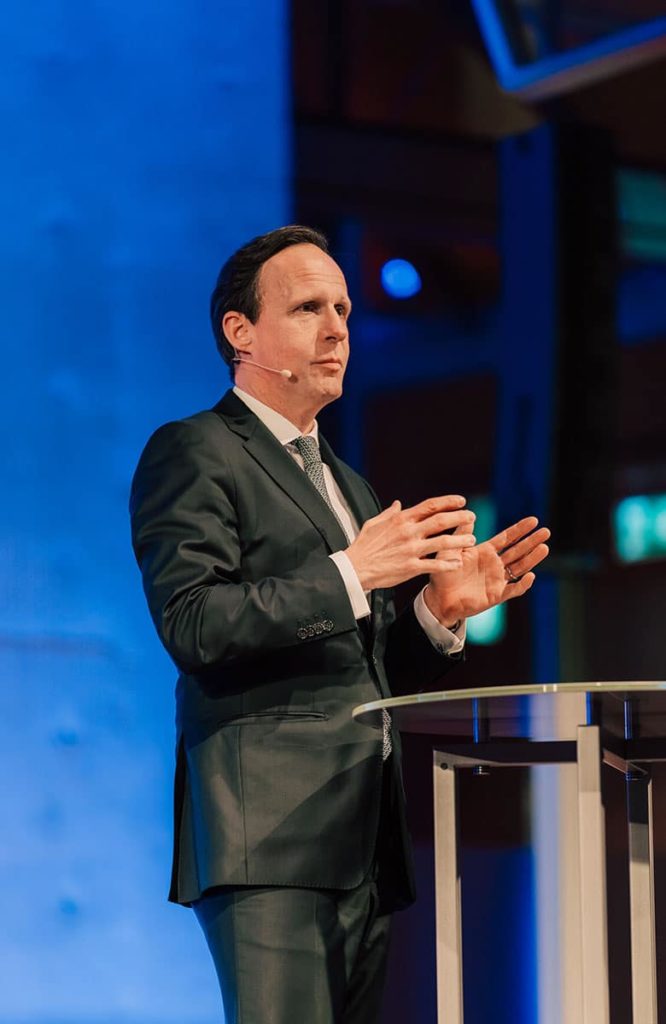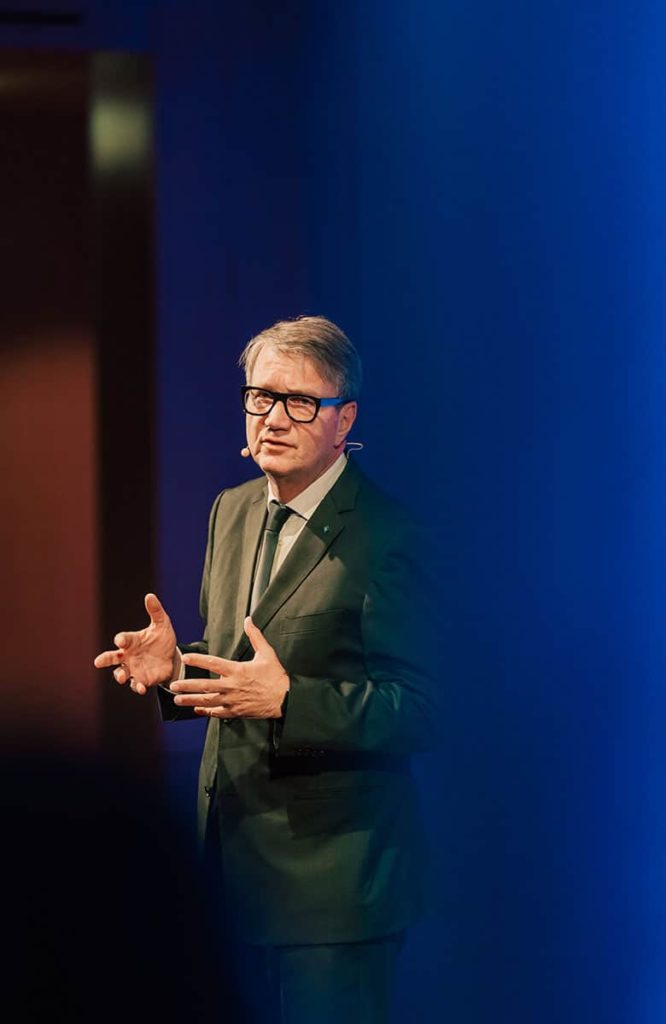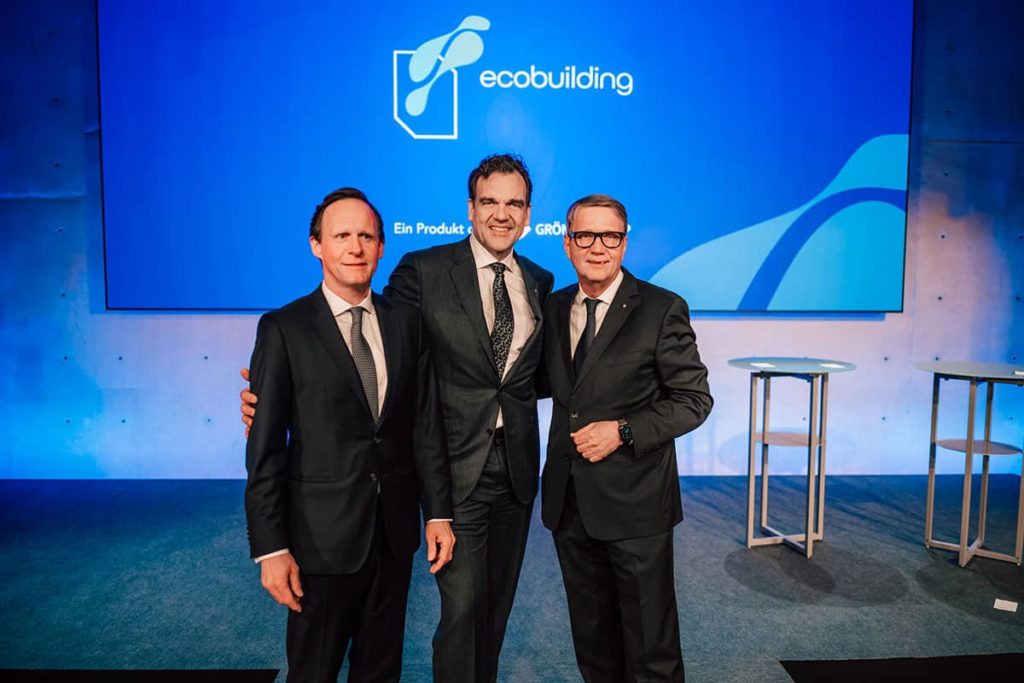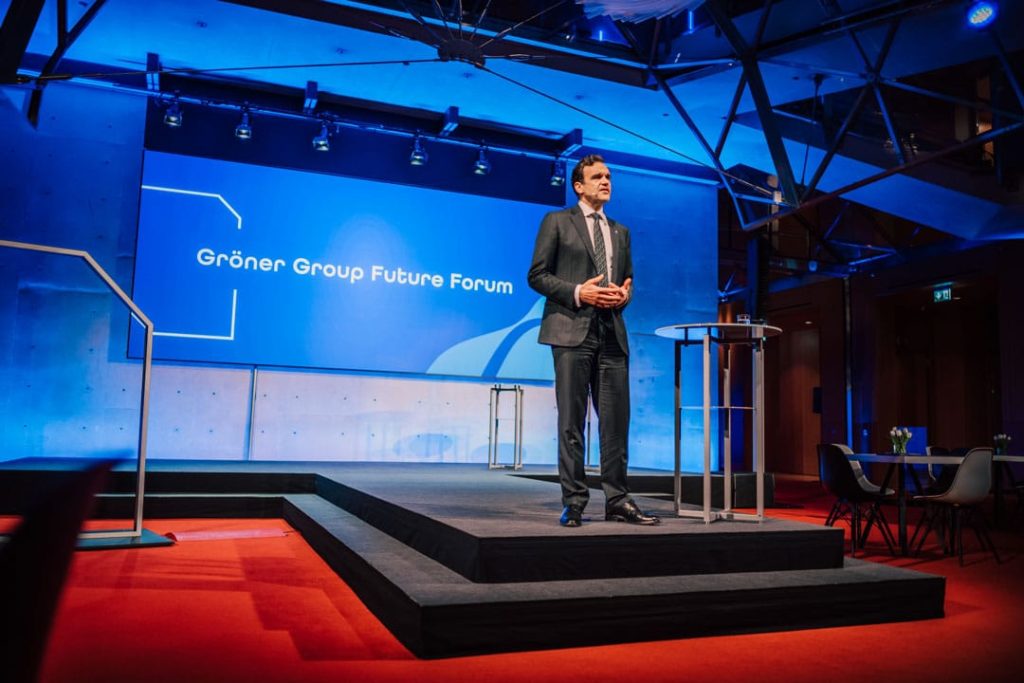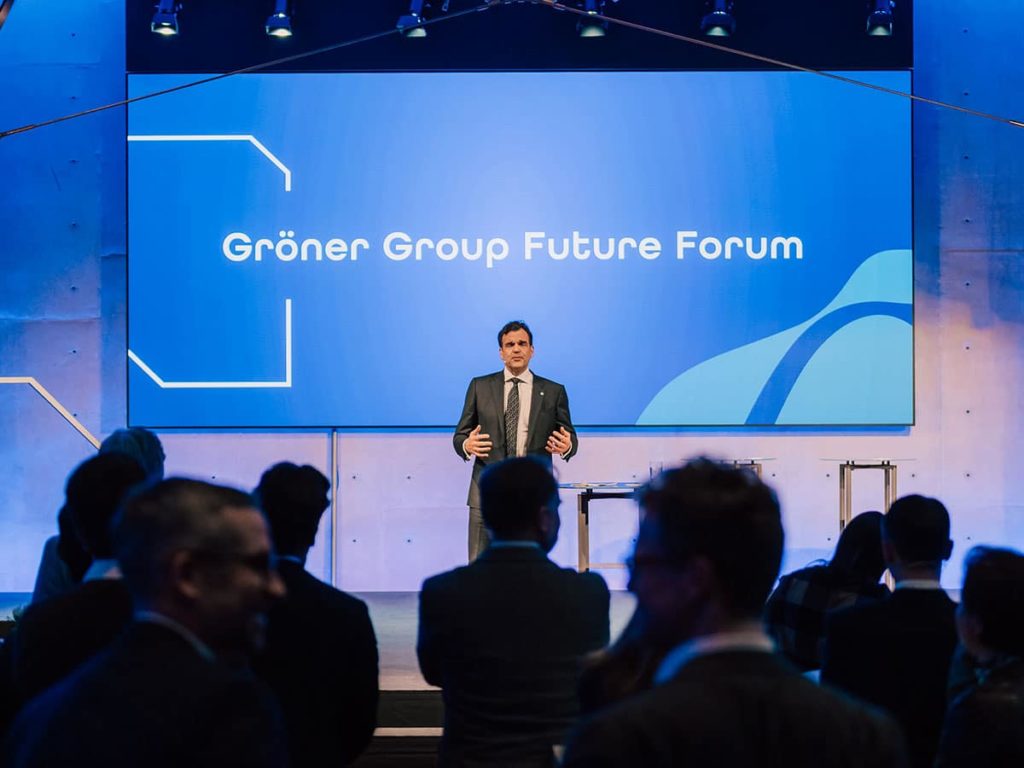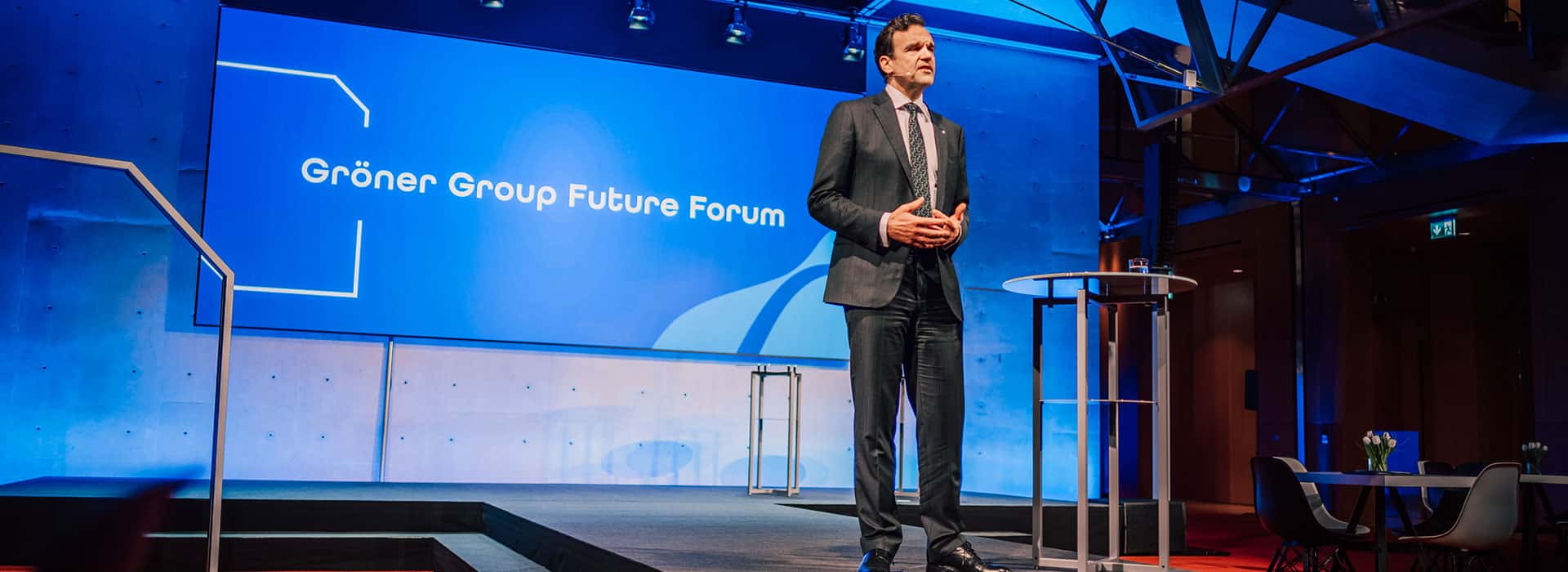
ecobuilding: Gröner Group defines ecological and innovative building and presents corporate strategy
The nationwide company Gröner Group AG, which specializes in digitalized sustainable building, presented its future orientation and its response to the key challenges of real estate development in Berlin on Thursday evening. Under the term "ecobuilding", the parent company of real estate developer CG Elementum will summarize its products in the future. At its core, ecobuilding stands for a new way of building and a new kind of buildings and neighborhoods.
“The prefix eco refers to the connection between ecology, economy and digital ecosystems, which has moved more strongly than before to the center of entrepreneurial activity,” as company founder and CEO Christoph Gröner emphasized. The Gröner Group places CO₂-neutrality, high-quality architecture, people’s requirements and economic efficiency equally at the center of its actions.
Understanding challenges for the building sector as motivation
At the beginning of the event, which was attended by over 180 guests, Management Board member and COO Ronald Pofalla explained the starting point of the strategy process, which involved the vast majority of the now 640 employees: “The building sector is responsible for around 30 percent of global greenhouse gas emissions. It is our mission to significantly reduce this rate and to make as large a contribution as possible to combating climate change. We combine the economic success of our company with the fulfillment of our social responsibility to reduce CO₂ emissions in the building sector.”
Ronald Pofalla pointed out that greenhouse gas emissions in Germany must fall by at least 88 percent by 2040 compared with the reference year, and emissions from the real estate sector must be halved by 2030. By 2040, the aim is to refurbish around 19 million homes in a climate-neutral way, while a good 400,000 new homes per year are to be built and managed in a climate-neutral way. To make matters worse, the construction industry is already short of around 250,000 employees.
“We are focusing on Building Information Modeling (BIM) and prefabrication,” Ronald Pofalla emphasized. In North Rhine-Westphalia and Saxony, the company is building two state-of-the-art prefabrication plants in 2023 and 2024. In the future, a wide range of components with a vertical range of manufacture of over 60 percent for residential and commercial construction will be produced at both sites. This will also enable the use of prefabricated components in refurbishment.
“In total, all our measures reduce CO₂ emissions by 80 percent from planning to construction and management,” Ronald Pofalla pointed out.
Digital and ecological innovation as a driver of entrepreneurial activity
“There can be no ‘business as usual,'” Gröner Group CEO Christoph Gröner called out to the guests from business, politics, media and society, aiming at the direct responsibility of the real estate industry, which, with a contribution of a good 20 percent to Germany’s gross value added, is a major player with enormous potential for change.
Christoph Gröner presented his company’s new claim to be a pioneer in technological and ecological transformation through innovation: “With digital planning, our projects are first created in virtual space, and later the data is sent to robots in our production halls. With prefabrication and serial production of building components, construction becomes a tenth cheaper and takes only half the time. At the same time, costs are easier to plan and construction is more environmentally friendly overall thanks to greater material efficiency. That’s what ecobuilding means.”
In terms of digital planning, the group is pursuing two directions: The CG Plan team is rebuilding familiar planning processes for the digital world, and the in-house start-up REHUB is redesigning the development of urban planning models all the way to execution planning. The interaction of both approaches leads to unconventional and highly innovative solutions.
Already today, one third of the 640 employees of the group of companies from 30 nations are engaged in these innovations. Last year alone, 21 experts for energy management and GreenTech joined the Gröner Group. “A company without this focus will no longer be active in the market in five or ten years,” added Christoph Gröner, and continued with a view to climate change: “We are convinced that others will follow our ecobuilding approach.”
The use of ecological materials and the re-use of existing building fabric ensures savings in CO2. Circular construction, which reuses recycled demolition material elsewhere, is already being implemented by Gröner Group in several construction projects. In our projects, we rely on the use of solar energy, geothermal energy and modern heating and cooling systems.
“By reducing the costs of construction and energy supply, we ensure that we provide affordable living and working space. ecobuildings are thus clearly ahead of their time,” added Christoph Gröner.
Modern structure and good governance enable innovation and ESG-compliant products
The new ecobuildings meet the wishes of customers. Management Board member and CFO Lars Schnidrig referred to the growing demand for ESG-compliant investment opportunities: “We stand for the development of sustainable living spaces in neighborhoods that are planned in a socially and environmentally responsible manner according to clear corporate standards and operated in a climate-friendly manner. In this way, we provide the answer to the wish of many investors. With prefabrication plants, recycling, our own energy management, lower CO2 emissions, a governance and compliance code, and high social commitment, we can act with broad shoulders.”
The “Wirtschaft kann Kinder (WKK)” association, co-founded by Christoph Gröner and supported by the Group, has collected more than four million euros in donations over the past three years, primarily for the benefit of children in need. In addition, the Gröner Group, CG Elementum and various employee:inside initiatives support, among other things, cultural sites, medical research, support the food banks, shelters and people who have become homeless.
“Gröner Group also sets its own high standards for corporate governance. In order to be transparent for investors and partners, the Group figures are very deliberately audited and certified by one of the so-called Big Four auditors,” Lars Schnidrig emphasized.
Already at the end of 2022, the Gröner Group completed the change in form from a GmbH (limited liability company) to a stock corporation in order to be able to pursue its own goals even more consistently. The Supervisory Board of the company reflects these goals and is composed of experienced members from business and politics. It boasts a wealth of experience in the company’s key areas of focus in the energy industry, digitization and good corporate governance. Under the chairmanship of the former board member of Allianz Pensionskassen AG, Dr. Peter Haueisen, the former State Secretary for the Environment of the State of Saxony-Anhalt and former CEO of Berlin-based GASAG AG, Vera Gäde-Butzlaff, the former CEO of Deutsche Bahn, Prof. Dr. Rüdiger Grube, the management consultant and entrepreneur Dr. Ulrich Metz, the former EU Commissioner for Energy and later responsible for the digital economy, Günter H. Oettinger, and the Managing Director of the Academy of International Affairs of the state government of North Rhine-Westphalia, Dr. Mayssoun Zein Al Din.
Press contact
Eva Mommsen
T +49 30 7675948 1263
E presse@groener-group.com
Gröner Group AG
Bismarckstraße 79
10627 Berlin

